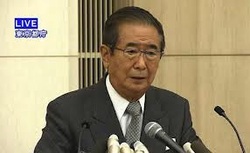 Photo: Urban Robot Cafe blog
Photo: Urban Robot Cafe blog Given that Hunter claims that Japan has been under a nationalist revival since the mid-1990s, his evidence for this consists of the historical revisionist movement among certain sections of Japanese academia (which is by no means unified in its appraisal of Japan’s imperial past) and the decision by former PM Koizumi Junichiro to allow the dispatch of elements of the SDF (GSDF engineers and MSDF supply vessels) to take part in the occupation of Iraq in 2003, building upon a decision in 1991 to support UN (not solely US) efforts in the Persian Gulf following criticism of Japan’s lack of material commitment to Operation Desert Storm. What should be noted here is that by no means was the Diet unified in its stance towards allowing the SDF to be dispatched abroad in 1991, and that Japanese participation in operations overseas since then has been limited to providing humanitarian support to reconstruction and peace-keeping activities (Green, Japan’s Reluctant Realism, COFR, 2003, p.203). Japan has consistently emphasised the importance of the UN in reaching decisions for multilateral intervention in international conflicts, and has played a leading role in the establishment of an international ministerial consultation group on nuclear weapon reduction and non-proliferation (together with Australia, a move that took place under an LDP government) (E).
An opinion poll conducted by the Office of the Prime Minister in January this year noted that 61.7% of respondents believed that it was important for Japan to make an active contribution to ensuring the peaceful resolution of conflicts and providing humanitarian assistance to other countries (J). Furthermore, in relation to whether the SDF should be more involved in operations abroad, only 28.1% of respondents agreed that it should, with a majority (61.3%) stating that there should be no change to the current range of SDF activities (J). While support for the LDP has certainly grown since the election of Abe Shinzo as leader (J), it represents a greater degree of dissatisfaction in the manner in which the Noda Cabinet has dealt with questions of reconstruction, consumption tax increases, and recent internal disputes within the DPJ than any endorsement of a more nationalistic bent in Japanese politics (J). Although Ishihara Shintaro has thrown his hat into the federal arena once again, at 80 years of age he isn’t exactly fresh faced or brimming with ideas, and if his only concerns are constitutional reform and finding new ways to irritate China and South Korea (E), he won’t exactly have broad appeal (certainly not among either the Keidanren, for his opposition to the TPP, or regional voters).
If Japan is in the midst of a nationalistic revival, it must be so low key as to be virtually indistinguishable from the status quo. Nationalistic politicians are not an anomaly in an otherwise pacifist Diet; they have always been a part of Japan’s political landscape, and exercised a variety of degrees on influence on the governments of the day. Abe Shinzo himself was prime minister for a year (2006-2007), and although he promoted a stronger stance in relation to Japan’s neighbours, at no time did he wish to jeopardize stability in favour of advocating outright confrontation with either China or South Korea (J). If Japan’s desire to protect its territorial integrity from incursions by foreign vessels is indicative of a rise in nationalism, then virtually every nation in East Asia, South East Asia, and Oceania is in the process of ramping up nationalism as a tool of state. To insinuate that Japan is somehow undergoing a transformation in political attitudes by stealth both misreads popular sentiment and ascribes motives that simply do not exist among the population at large. It is, in other words, a false observation, more instinctive than based on fact, and one that think tanks should avoid.
 RSS Feed
RSS Feed